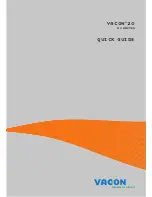
– 7 –
Manual P5/EP5 23740/98.10
2.
Function
1
2
7
8
3
5 6
4
The P5 operates on a force balance principal. Force is originated by the
signal pressure transmitted through a diaphragm on to the balance
arm. The opposing force is achieved through the feedback spring and
is proportional to the position of the lower arm. The lower arm posi-
tion is determined by the position of the cam which is secured to the
spindle and connected to the actuator shaft thus providing the feed-
back from the actuator/valve. When these two forces are equal, the
balance arm and the spool in the pilot valve are in a neutral position
-the complete unit is in a balanced position. Air is supplied to the pilot
valve through port S, and controls the air flow through ports C1 and
C2
Assume an equilibrium position.
An increased control pressure will deflect the diaphragm 1 down,
compressing the feedback spring 3. The balance arm 2 moves the spool
7
in the pilot valve 8 furnishing supply air to the actuator, while at the
same time air is exhausted from actuator and is vented to atmosphere
through the pilot valve and the OUT port .
With the increased supply air, the actuator rotates (or moves linearly)
moving the positioner spindle 6. The spindle and cam 5 rotate, forcing
the lower arm 4 upwards compressing the feedback spring 3. This
motion will continue until the two forces are equal and the unit is in an
equilibrium position.
Summary of Contents for EP5
Page 1: ... 1 Manual P5 EP5 23740 98 10 Manual P5 EP5 PMV Valve Control System alve Control System ...
Page 22: ... 22 Manual P5 EP5 23740 98 10 17 Exploded Drawing 98 9 84 ...
Page 24: ... 24 Manual P5 EP5 23740 98 10 Approvals E5 IS EU ...
Page 25: ... 25 Manual P5 EP5 23740 98 10 Approvals E5 EX EU ...
Page 26: ... 26 Manual P5 EP5 23740 98 10 Approvals E5 IS US E5 EX US 1 ...
Page 27: ... 27 Manual P5 EP5 23740 98 10 Approvals E5 IS US E5 EX US 2 ...
Page 29: ... 29 Manual P5 EP5 23740 98 10 FM ...
Page 30: ... 30 Manual P5 EP5 23740 98 10 CSA ...








































